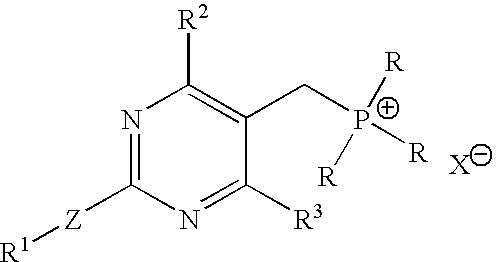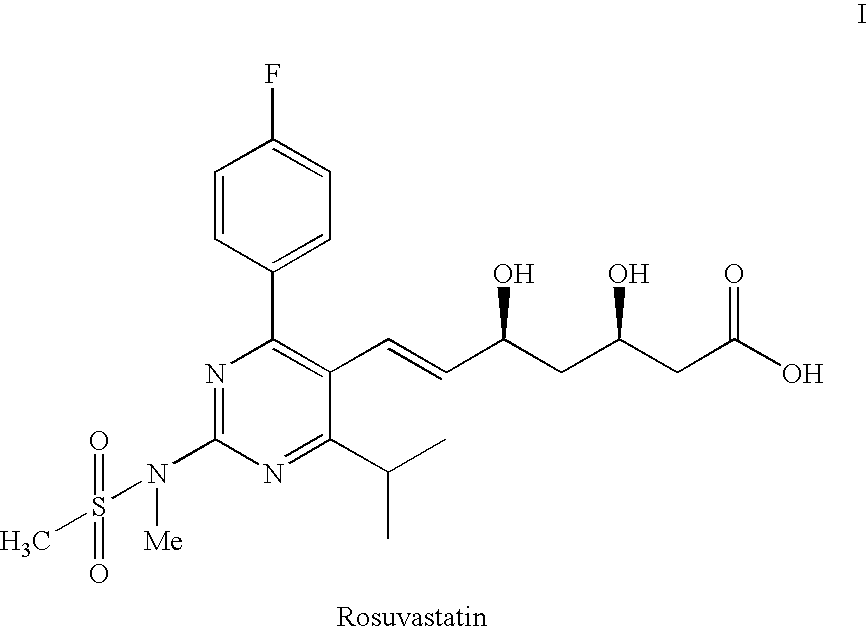Process for the preparation of pyrimidine derivatives
a technology of pyrimidine and derivatives, which is applied in the field of improved process for the preparation of pyrimidine derivatives, can solve the problems of difficult preparation, expensive reagents, and process more difficult to perform
- Summary
- Abstract
- Description
- Claims
- Application Information
AI Technical Summary
Benefits of technology
Problems solved by technology
Method used
Image
Examples
example 1
Preparation of TPPBr
[0045] Into a 2 L 4-necked round bottom flask, [4-(4-fluorophenyl)-6-isopropyl-2-(N-methyl-N-methyl sulfonylamino)pyrimidin-5-yl]methanol (100 g), toluene (800 ml) and acetonitrile (400 ml) were added at a temperature in the range of from about 25° C. to about 30° C. under stirring. The reaction mixture was cooled to a temperature of about 15° C. Phosphorous tribromide (35 g) was slowly added over about 30 minutes at a temperature in the range of from about 15° C. to about 20° C. After about 30 minutes, the reaction mixture was added to water (1000 ml) while maintaining the temperature in the range of from about 15° C. to about 20° C. The reaction mixture was stirred for about 5 minutes and the organic layer was separated.
[0046] The organic layer was washed with a 10% solution of sodium bicarbonate (500 ml), followed by water (500 ml). The organic layer was concentrated at a temperature in the range of from about 60° C. to about 70° C. under reduced pressure un...
example 2
Preparation of TBPBr
[0048] Into a 2 L 4-necked round bottom flask, [4-(4-fluorophenyl)-6-isopropyl-2-(N-methyl-N-methyl sulfonyl amino) pyrimidin-5-yl]methanol (100 g), toluene (800 ml) and acetonitrile (400 ml) were added at a temperature in the range of about 25° C. to about 30° C. under stirring. The reaction mixture was cooled to a temperature of about 15° C., and phosphorous tribromide (35 g) was added at a temperature in the range of about 15° C. to about 20° C. slowly over about 30 minutes. Next, the reaction mixture was added to water (1000 ml) over about 30 minutes, while maintaining the temperature in a range of from about 15° C. to about 20° C. The reaction mixture was stirred for 5 minutes at a temperature in the range of from about 15° C. to about 20° C. The organic layer was separated and washed with 10% solution of sodium bicarbonate (500 ml) followed by water (500 ml). The organic layer was concentrated at a temperature in the range of from about 60° C. to about 70°...
example 3
Preparation of BEM
[0050] Into a 2 L 4-necked round bottom flask, DMSO (600 ml), potassium carbonate (104 g), TPPBr (170 g) of Example 1 and BFA (65 g) were added at a temperature in the range of from about 25° C. to about 35° C. under stirring. The reaction mixture was heated to a temperature in the range of from about 70° C. to about 75° C. for about 2 hours. After completion of the reaction as determined by TLC, the reaction mixture was cooled to a temperature in the range of from about 25° C. to about 35° C. Toluene (1000 ml) was added for dilution of the reaction mixture under stirring for about 30 minutes at a temperature in the range of from about 25° C. to about 35° C. The reaction mixture was filtered, and the insoluble cake was separated. The organic layer was added to water (1000 ml) under stirring at a temperature in the range of from about 25° C. to about 35° C. and maintained for about 30 minutes.
[0051] The organic layer was separated and washed twice with water (2×10...
PUM
| Property | Measurement | Unit |
|---|---|---|
| temperature | aaaaa | aaaaa |
| temperature | aaaaa | aaaaa |
| temperature | aaaaa | aaaaa |
Abstract
Description
Claims
Application Information
 Login to View More
Login to View More - R&D
- Intellectual Property
- Life Sciences
- Materials
- Tech Scout
- Unparalleled Data Quality
- Higher Quality Content
- 60% Fewer Hallucinations
Browse by: Latest US Patents, China's latest patents, Technical Efficacy Thesaurus, Application Domain, Technology Topic, Popular Technical Reports.
© 2025 PatSnap. All rights reserved.Legal|Privacy policy|Modern Slavery Act Transparency Statement|Sitemap|About US| Contact US: help@patsnap.com



